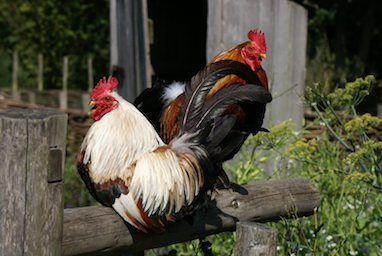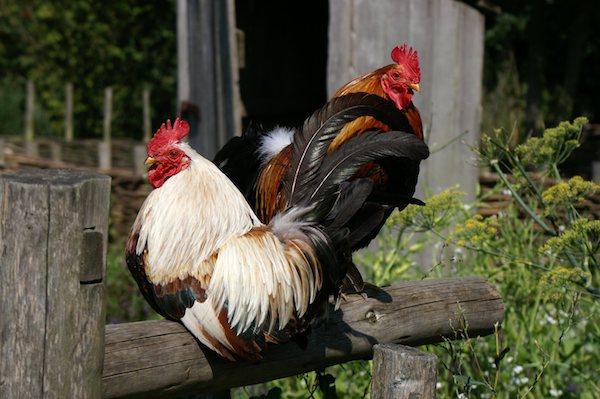Baltimore County should ease restrictions to allow more backyard chickens

KONICA MINOLTA DIGITAL CAMERA

Commentary: Backyard chicken enthusiasts and the Baltimore County Council have been playing a game of chicken for nearly 10 years. The current county code requires one acre of land for the raising and keeping of backyard chickens (Code § 13-7-311). Yet, since most residences within the County’s suburban landscape are well below one acre in size, this regulation is basically a ban on backyard chickens.
The pressure to change the law in Baltimore County is mounting as interest in backyard chickens, spurred on by the locavore and urban agriculture movements, and, of course, Martha Stewart, continues to grow. Growing as well are the number of people raising “outlaw” chickens.
What’s the big deal about chickens? For the past 10,000 years, give or take, chickens and humans have been inextricably linked. As late as the 1920s, most of the eggs produced and consumed in the U.S. came from backyard farms, not large-scale production facilities. During WWI, the U.S. government linked patriotism with the raising of chickens. Posters stating, “Uncle Sam Wants You to Keep Hens and Raise Chickens” and “Let the Hen Whip the Kaiser” were commonplace.
Laws restricting chickens only truly came into being as America’s suburban landscape with modern supermarkets began to grow up on the agricultural lands outside of major cities thereby disconnecting people from food production. Today, less than 1% of the population lives or works on a farm. Ask a child where their food comes from, and the likely answer will be the grocery store. It is this disconnect combined with residual misconceptions and a general lack of education and understanding regarding farming within and throughout the general population and lawmakers, that has made it more difficult for those seeking to raise backyard chickens to change laws. But the tide is slowly changing. In jurisdictions large and small, the laws are changing.
In Baltimore County, Facebook Groups like “Chicken Revolution – Baltimore County” and “Changing the Zoning Laws in Baltimore County for Chickens and Small Livestock” hope that the tide of change sweeps through Baltimore County.
People are drawn to backyard chickens for a variety of reasons. Some see it as a way of fighting big agriculture. Others want healthier options for their families. Studies prove that fresh eggs, raised at home are healthier. They contain:
- 1/3 less cholesterol
- 1/4 less saturated fat
- 2/3 more vitamin A
- 2 times more omega-3 fatty acids
- 3 times more vitamin E
- 7 times more beta-carotene.
While eggs may be the catalyst, those who own chickens soon realize that chickens have unique personalities and are infinitely entertaining. They become well-cherished pets, members of the family. Retirement communities and elder care facilities have begun to introduce chickens as part of their client’s therapy as companions to combat loneliness and depression. It seems a little counter-intuitive that a family can purchase and raise any manner of pet bird from canary to parrot in Baltimore County without a permit or a license, but not a chicken.
Seven cities—Dallas, Indianapolis, Jacksonville, New Orleans, Plano, Raleigh, and Spokane—do define chickens as domestic animals or pets, and thus subject them to the same enclosure and nuisance regulations as other domestic animals like cats and dogs.
Those that oppose the proliferation of backyard chickens cite a variety of concerns which parallel those associated with all domestic pets, including, noise, smell, rodents, and trespassing.
Noise: While regulations vary greatly, the exclusion of roosters is found almost universal. Compared to their male counterparts, hens are quiet, registering the same decibel level (65) as human conversation — as compared to 100 for a dog’s bark. And, whereas a dog may bark at night, hens put themselves to bed when the sun goes down, and sleep soundly until it rises the next morn.
Smell: A well-ventilated coop that is cleaned regularly will not smell. And, whereas dogs, who produces 3 times as much waste per day than a hen, and whose feces is pathogenic, chicken waste may be spread directly onto home gardens as fertilizer. A bag of chicken manure purchased in a store costs between $10-$20.
Rodents: Some fear that chickens attract rodents, but that fear is not supported by science. Chickens are omnivores that actually eat rats and mice. What attracts rats is access to food and shelter. In yards without chickens, rats may be found taking advantage of bird seed in feeders, trash cans, dog waste, and unkempt vegetable gardens. Baltimore County has a robust rat eradication program in effect, that has seen great success. Therefore, given a situation where a person is managing their chickens in a way that attracts rodents, i.e. unsecured feed supply, there is a hotline and process in place to investigate and, if necessary, cite the offender. Further, were chickens responsible for attracting rodents, it stands to reason municipalities that have recently changed their laws to accommodate backyard chickens, would be reversing course in short order. Annapolis, for instance, changed their law in 2012, and there has not been overrun with rodents.
Trespassing: In many a town hall discussion about chickens, neighbors voice concern that chickens will be left to run wild in the streets. Just like dogs or cats, a chicken is likely to get loose. Like dog and cat owners, chicken owners are just as likely to put in place all manner of barriers to escape and to go after and capture any errant bird. As a major prey species, chickens understand the importance of seeking shelter and safety during the night, and even a bird who wanders off one day will come home to roost in the evening.
Were Baltimore County to simply classify chickens as pets, chicken owners would be required to keep control of the animals, license the animals (Maryland Department of Agriculture manages chicken license process), remove pet waste in a timely manner, assure they have food and water and shelter or be subject to penalties as currently meted out by animal control.
Right now, Baltimore County’s law is based on lot size. This type of regulation is very common but varies greatly. For example,
- Seattle allows up to eight chickens for lots under 10,000 square feet, and one more chicken for each additional 1,000 square feet.
- Fremont has a step system, with four chickens for at least 6,000 square feet, six for at least 8,000 square feet, 10 for at least 10,000, 20 for at least ½ acre, and 25 for more than one acre.
- Riverside allows for up to four chickens on property between 7,200 and 40,000 square feet and up to 12 on property 40,000 square feet or more in residentially zoned areas.
- Fort Worth allows for no more than 12 chickens on lots under ½ acre, no more than 20 on lots between ½ and one acre, and no more than 50 on lots of one acre or more.
- Louisville allows for five chickens on property of less than ½ acre, and no limit above that.
- Arlington provides for four on less than ½ acre, 10 for lots between ½ and one acre, and 25 for lots over one acre.
What these regulations have, however, and Baltimore County does not, is an upper limit. So currently, a family may not own a single chicken if their lot size of .9 acre but could conceivable own upwards of 12,000 chickens on a lot size of 1 acre, based on the 3.6 square foot per chicken that is recommended by animal scientists. Given such absurdity, it seems like there is room to accommodate adjustments in the current rule to give more families the opportunity to raise chickens in a manner that is healthy, safe and without nuisance.
Based on their study of backyard chicken regulations throughout the county, the Environmental Law Reporter developed a model ordinance for jurisdictions to use as a guide. They recommend:
- Chickens be regulated within the animal control section of municipal code.
- That flock size be limited to between 4-6
- Lot size should not be restricted but that coops should be placed 50 feet from any doors or windows of residences.
- Sanitary conditions must be kept
- Chickens should be kept in coops and runs at all times
- Prohibition against the slaughter of chickens
- No roosters
- No permit that creates a financial burden for families wishing to raise chickens
Councilman David Marks, who represents the Towson area, said he supports “modifying the law, and in general want to provide healthier options for all our residents.” This support was tempered by his concern that the increase in backyard chickens would lead to an increase in code complaints that would stress limited enforcement resources. His suggested compromise, “If the law is changed, it should be coupled with an increase in code inspectors.”
It is difficult to predict whether or not Baltimore County’s outlaw chicken keepers will finally be able to come out of the shadows, and families throughout the county will finally be able to raise a flock of their own. What is certain, however, is that the new Baltimore County Council will have a lot on their plates, and if the backyard chicken enthusiasts have anything to say about it, chicken will be on the menu.

Bronwyn Mitchell-Strong has been raising chickens for over seven years. Her book, Roost: Confessions of a First-time Chicken Farmer, published by Apprentice House Press, was released on October 1. The book launch, reading and signing, combined with an intro to backyard chickens, will be held on October 6 from 4PM-6PM at the Baltimore County Agricultural Center in Hunt Valley. A portion of the proceeds from the event will be donated to The Maryland Agricultural Resource Council to support agricultural education programs. For more information: http://marylandagriculture.org/backyard-chicken-keeping-intro-class-and-book-signing/

Hens shouldn’t be allowed unless roosters are allowed as well. Otherwise, Baltimore county is going to find that their going to have an influx of roosters being abandoned and/or dumped at their animal shelters where they have nowhere to go since nobody in the surrounding area will be allowed to keep them. It is what is happening everywhere else in the country. Just look at Adopt a Bird Network, who helps these birds find homes – http://www.adoptabirdnetwork.com
I don’t trust chickens.
Chicken coops are filthy and attract various scavengers, rodents, snakes, etc. I live in Rodger Forge. I can’t imagine allowing chickens in row house neighborhoods. I love chicken and eggs but not in my backyard.